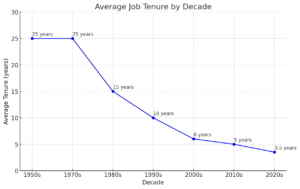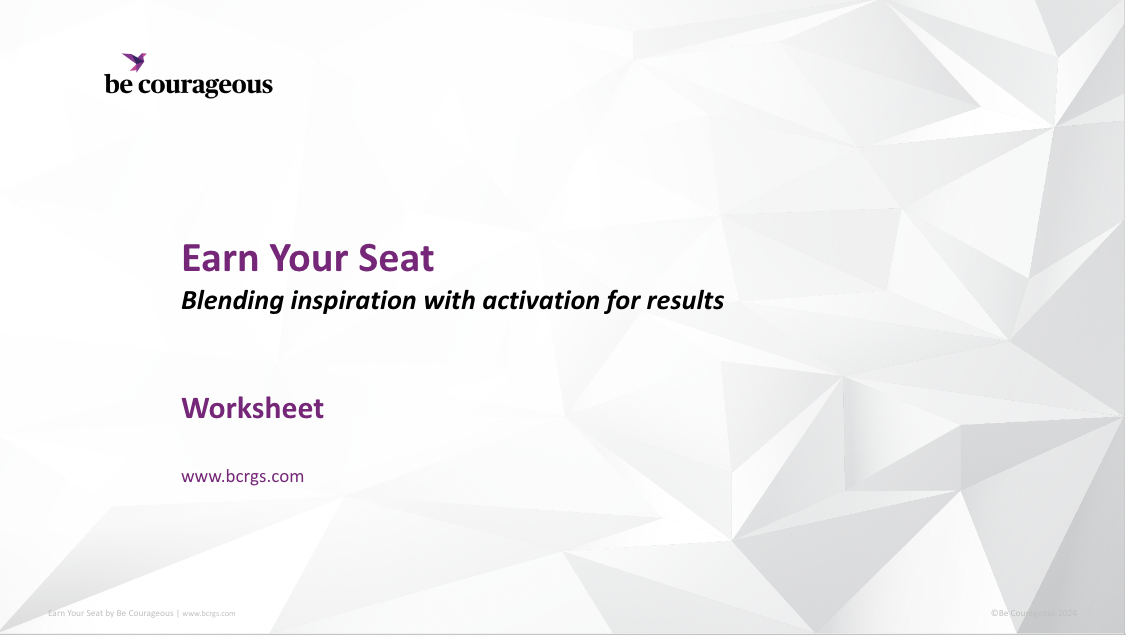Blending inspiration with activation for results
Remember the days when people got a job, climbed “the ladder,” and then, with a big party, retired with a full pension from the same company?
Back then, you might have seen a colleague’s feet go up on a conference table and take a comfortable lunch hour. It wasn’t that people were lazy; it was that there was security in knowing you had a job, and unless you embezzled or broke the law, you’d probably have your job for as long as you wanted it.
Career longevity within a single company was not only common but expected. It symbolized stability, loyalty, and the gradual acquisition of invaluable experience. But all that has changed.
Shifts in career longevity
Companies and individuals have shifted from a “work here for life” to a “work here for as long as it is mutually beneficial” culture. Author of “Unlearn,” Barry O’Reilly has coined the term, “Portfolio Career” to describe this.
Check out this the average length of time a person stayed at the same company over the last 75 years.

1950s 20-30yrs | In the post-WWII era, job stability was high, and it was common for workers to stay with the same company for their entire careers. The economy was growing, and companies often provided generous pensions, encouraging long tenures. |
1970s 20-30 yrs | The trend of long-term employment continued through the 1970s, with many workers remaining with the same employer for 20 to 30 years, especially in manufacturing and public sector jobs. |
1980s 10-20yrs | The beginning of the shift from manufacturing to service-based jobs, increased layoffs in certain industries, and a growing emphasis on career mobility. |
1990s 5-15yrs | Economic changes, including globalization and technological advancements, continued to impact job tenure. |
2000s 4-8yrs | Partly due to the dot-com bubble burst and the 2008 financial crisis. |
2010s 3-7yrs | The rise of the gig economy and a cultural shift towards valuing diverse work experiences. Economic recovery post-2008 financial crisis also meant more job opportunities and therefore more job switching. |
2020s 2-5yrs | The COVID-19 pandemic introduced significant disruptions to employment, with many industries facing layoffs, furloughs, and shifts to remote work, changing attitudes about career progression, as well as the “gig economy,” and “portfolio careers.” Source: Research & graph by: FIN |
The pace of change in the current working environment is relentless, and demands on individuals and teams are ever-increasing. Layoffs don’t just happen every handful of years, but a handful of times in a single year. With the rise of artificial intelligence, employees feel like they’re expected to perform at the pace and advances of technology – making us more like robots than humans.
And lunch hour? Ha! What’s that?
Adaptability, creativity, resilience, and courage are paramount to thrive in the future business landscape. The concept of “Earning your seat at the table every day” is more relevant than ever.
Complacency is the enemy of progress
Consider Amazon’s “Day 1” mantra which treats every day as a fresh start, and to stay in a state of innovation, urgency, and the pursuit of excellence.
The sentiment is mirrored by Dwayne “The Rock” Johnson who says: “Success isn’t owned, it’s leased, and Rent’s Due every single day,” and, “A comfort zone is a beautiful place, but nothing grows there.”
Complacency is the enemy of progress.
Earning your seat with inspiration and activation
Tenure may no longer be the golden ticket it once was, but there’s a way to navigate this reality without succumbing to the cutthroat competition it often breeds.
The key lies in blending inspiration with activation, creating an environment where performance is pursued without sacrificing the soul of the human and workplace.
The challenge for leaders and individuals alike is to foster a culture that marries high performance with empathy, creativity with accountability, and nurturing a team that is as agile and innovative as it is compassionate and connected.
So, how do we achieve this delicate balance?
Building robust, trusting relationships within a team is crucial. Help your team lean into discomfort, and embrace the unknown with a sense of adventure rather than dread. When teams operate from a place of mutual respect and understanding, they become antifragile—thriving on challenges and emerging stronger from any adversity.
Courageous Relationships
Workshop Series
In this eight-week interactive workshop and coaching series, your team will elevate trust, collaboration, and performance.
Cultivating intrinsic motivation
Moving beyond a purely competition-driven mindset requires anchoring to creativity and a more profound sense of purpose. What motivates us should not be the fear of being surpassed but the aspiration to contribute meaningfully to our teams and the broader societal challenges we face. This shift from external to intrinsic motivation is vital for sustained engagement and innovation.
Embracing a culture of listening, learning, and adaptability
Because our landscape is characterized by rapid shifts and disruptions, a commitment to continuous listening, learning, and adaptability is essential. Be prepared to pivot, reassess, and realign strategies in response to evolving circumstances. This agility is what allows individuals and organizations to stay relevant and competitive.
The human element
Let’s not forget that in each seat at the table is a human being. In our quest for high performance, we cannot lose sight of the importance of empathy, and compassion, and of fostering a workplace where individuals feel valued and understood. It’s this human-centric approach that ultimately enables teams to transcend the ordinary, innovate, and achieve remarkable results.
Earning your seat…every day
When you have your seat, it’s not a given that you’ll keep it. Your seat comes with pressure and responsibility, whether you’re in a junior position inside a large, established organization, a senior executive in a hungry up-and-coming startup, or the boss of your own company.
You have to earn your seat at the table. Not just once, but over and over, consistently. But there are gifts in not taking your seat for granted.
Seats will go to those who are prepared.
Free tools to help you prepare:
- Develop ambidexterity skills (free tool here).
- Get clear on your and your team’s bigger purpose for daily motivation (free tool here).
- Create courageous relationships in your team (workshop here).
- Get comfortable with the uncomfortable (free tool here).
Take responsibility for your seat, and, as Be Courageous partner Mark Bonchek says, “Actively explore your fall edge.” Always explore the edge of your ability and thinking, because when you do, new doors open to growth, discovery, and elevation.
Seats go to people who provide the most value. And while there are never guarantees, if you go the extra mile with the true intentions of your team and your company, chances are it will be recognized.
Co-writer: Shannon Geher//Research: FIN
"Earn Your Seat" Tool
Your free worksheet to help you and your team go from status quo to irreplaceable.



